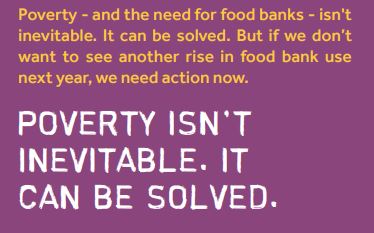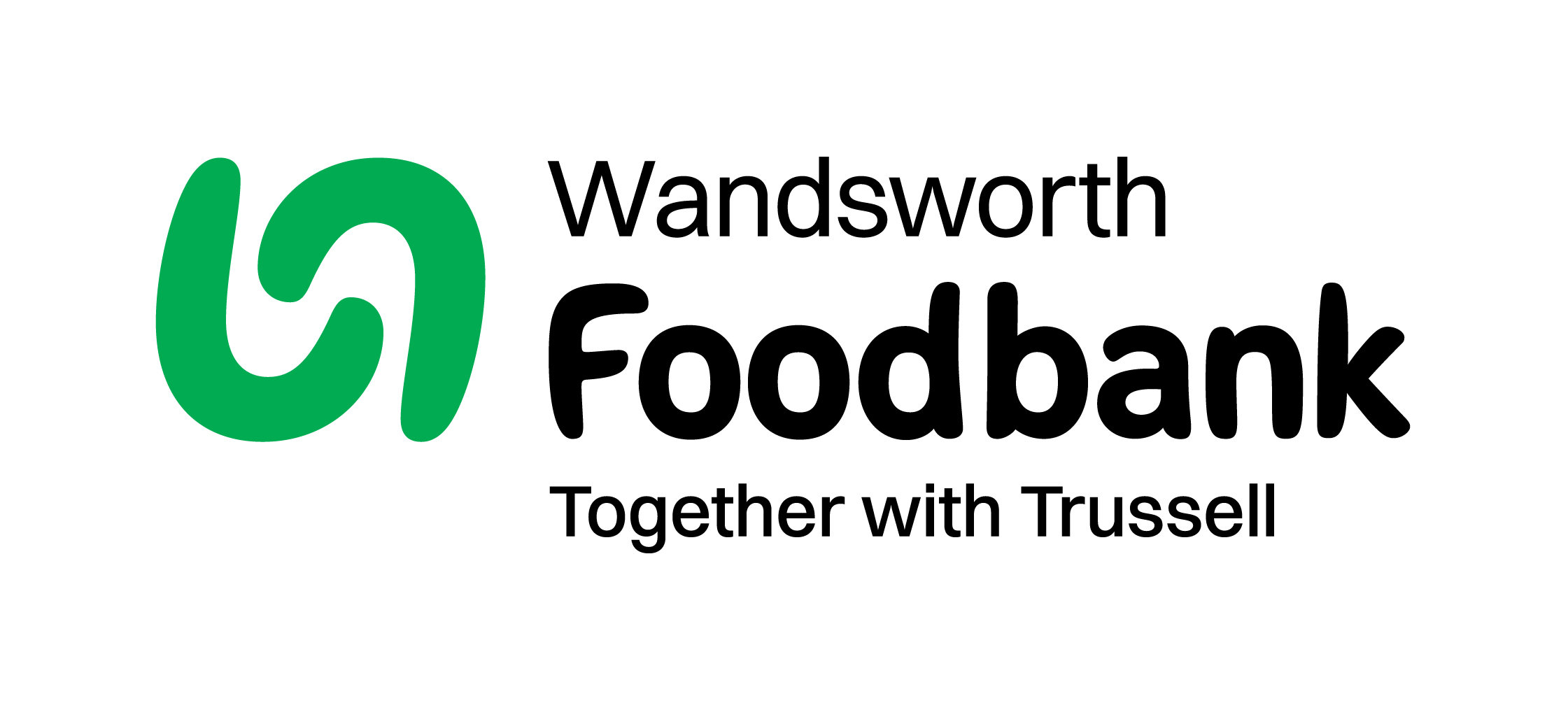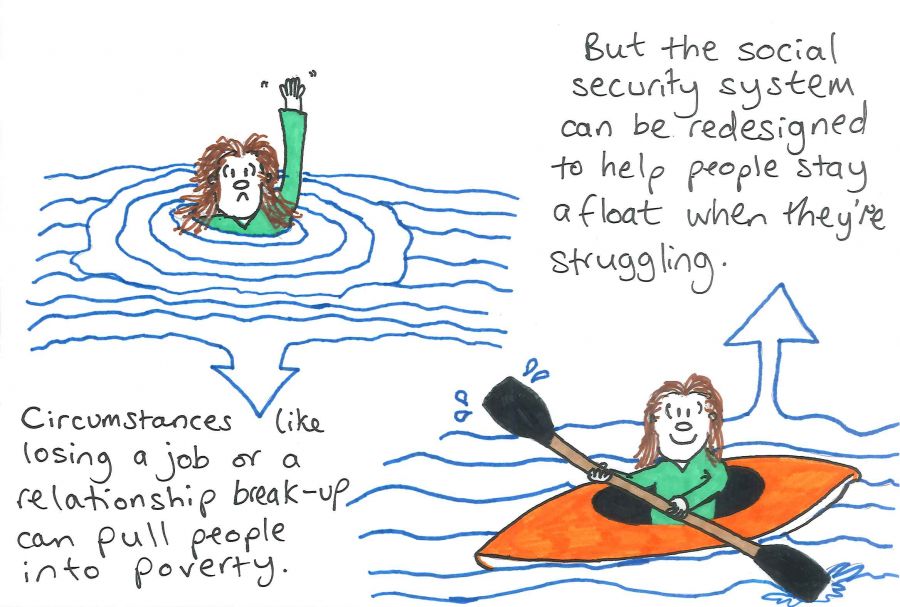News
WE PROVIDED A RECORD NUMBER OF EMERGENCY FOOD SUPPLIES TO LOCAL PEOPLE IN CRISIS IN 2018-19. WE’RE CALLING FOR URGENT ACTION TO END POVERTY AND THE NEED FOR FOOD BANKS.
20th June 2019
Share this: facebook link twitter link linkedin link

We’ve just released our report into poverty, hunger and food bank use in Wandsworth Borough. We provided a record number of emergency food parcels in 2018-19, and we’re calling for urgent action to loosen the grip of poverty on local children and adults, and end the need for food banks
During April 2018-March 2019, Wandsworth Foodbank provided 5,770 three-day emergency food supplies to local people referred in crisis– more than any year since it opened in 2013. This was an 11% increase from 2017-18, and a 78% increase from five years ago.
Worryingly more than one-third of emergency food supplies were for children (37%), the majority of whom were primary school age or younger. One in eight food bank referrals were from Wandsworth schools and children’s centres.
Since 2016, child poverty across Wandsworth has increased by 3% to 36% of children living in poverty after essential housing costs[1]. Children in some wards are particularly adversely affected, such as Queenstown Ward and Roehampton and Putney Heath Ward (where 51% of children live in poverty) and Latchmere Ward (47%). These are also the three wards seeing the most referrals to Wandsworth Foodbank last year, as well as an above average proportion of emergency food supplies for children: in Queenstown Ward, 53% of supplies were for children; Roehampton and Putney Heath 44%; Latchmere 40%.
The findings suggest there may be large numbers of children not receiving the nutrition necessary for appropriate growth and development. The UK Royal College of Paediatrics and Child Health (RCPCH) reported that of children in the UK who are living in poverty, those from the most deprived backgrounds experience much worse health[2].
One local school referrer taking part in the Foodbank’s research said: ‘If it wasn’t for Foodbank I just do not know how our families would manage. There would be far more ill-health due to lack of food, more segregation due to lack of appropriate clothing and hygiene, and depression due to being unable to provide basics for your family… I’ve never seen life being so hard for so many.’
Statutory services made two-thirds of all Foodbank referrals during the year (64%), indicating that the food bank is now an integral part of the social safety net – even though this was never its intention.
Wandsworth Council made nearly 700 food bank referrals, accounting for one in four of all referrals. Statutory health services made 13% of referrals, with the majority of these from local GPs (69%); followed by mental health services (22%), health visitors (5%) and hospitals (4%). While Department of Work and Pensions policy prevents jobcentres from becoming food bank referral partners, it encourages jobcentres to ‘signpost’ customers to food banks and other sources of voluntary sector support – and these accounted for 11% of all referrals last year.
For local referrers, Wandsworth Foodbank appears to be a sadly necessary part of the support they were able to offer people last year:
‘It’s genuinely benefited our vulnerable service users by meeting needs in times of real crisis; where no other service can do this. Without such important work, our service users’ wellbeing would deteriorate further and this has been prevented by this service. I am so glad such services exist.’ NHS referrer.
‘It’s proving a sadly vitally needed service to families in desperate need; doing so with compassion and without inducing shame they already feel.’ Local authority referrer.
The report finds that financial hardship, poverty and hunger severely impacts the lives of local people who experience it; and the report calls for poverty and its associated health and social inequalities in Wandsworth to be an urgent public health priority.
Poorer mental health and problem debt were the most common impacts of poverty and food insecurity, cited by nine in ten local referrers. Two–thirds of referrers cited poorer physical health (63%) as an impact they’d seen – rising to 93% of NHS referrers. Precarious housing, people actually becoming homeless, and social services needing to become involved with a family or individual were some of the other impacts of poverty and food insecurity cited by a majority of Foodbank referrers. One voluntary sector referrer wrote:
‘I find it difficult when a person has struggled with mental health and their access to [benefits] is taken away almost immediately, thus affecting the person’s mental health further. It is about the impact this has on people’s mental health and wellbeing to leave them with no access to money at all. I really appreciate the Foodbank because without this organisation I wonder how some of my clients will eat from week to week.’ Voluntary sector referrer.
The top three reasons for referral to the food bank were ‘benefit delays’ and ‘benefit changes’ (40% of referrals), and ‘income not covering essential costs’ (30% of referrals).
The five-week wait for first payment of Universal Credit (UC) was the most commonly-cited benefit issue leading to food bank referral, cited by seven in ten referrers. The report suggests that most people simply cannot afford to wait a month or more without income for basic essentials, and that UC Advance Payments are a debt not a solution; both raising questions as to how right or reasonable it is for the government to design this five-week delay deliberately into Universal Credit policy:
‘The waiting time for UC is still too long. The majority of UC funds are soaked up by rent and people fall into arrears. Another of our clients, due to the above barriers, has only £5.00 a week to live on.’ Voluntary sector referrer.
Wandsworth Foodbank’s report contains six recommendations for reducing poverty and the need for food banks locally; including the government ending the five-week wait for first payment of Universal Credit; and Wandsworth Council creating and publishing a local Anti-Poverty Strategy in partnership with multiple stakeholders – including statutory sectors (e.g. school, health, police, housing association), voluntary sectors, and private sector (e.g. local businesses, developers) – which would include key objectives of reducing child poverty, reducing the link between poor health and poverty, and reducing in-work poverty locally (see p3 of the report).
Dan Frith, Wandsworth Foodbank Manager, says:
‘This is the sixth Wandsworth Foodbank report. They’re a really important part of what we do. When you’ve worked all year helping people climb out of the river, it’s vital to go upstream and see what’s pushing them in. When we set up Wandsworth Foodbank in 2013 we hoped we wouldn’t be needed for long. But sadly the need for emergency food continues to increase: 78% in five years.
There are always mixed feelings running a food bank. It’s a privilege to stand alongside and support local people who’ve been pulled into poverty and crisis; to work with our amazing team of 200-plus regular volunteers, and everyone who generously donated 64 tonnes of food and basic toiletries to help others in our community. It’s great to be able to provide specialist advice in partnership with Citizens Advice Wandsworth, to help people resolve the problems that have pulled them in to crisis.
But it’s not right that anyone in Wandsworth should need to use a food bank to meet their or their family’s basic needs. No one – and no child – in our country should be put in that position in the first place. We’re glad to be able to help, but it’s a concern when small charities like ours are becoming relied upon as an integral part of the social security system – when that system should and could be the very one that prevents poverty and hunger.
We believe that poverty isn’t inevitable. It’s fixable. I would love it if Wandsworth Council and the government would action the recommendations from our report – which echo what food banks and charities are saying across the country – so that next year we see less people, not more, needing to use Wandsworth Foodbank.’
[1] End Child Poverty. Regional Estimates LAD London with summary. www.endchildpoverty.org.uk/poverty-in-your-area-2019/ (accessed 31 May 2019).
[2] Viner R, Ashe M, Cummins L et al. State of child health London, United Kingdom. Royal College of Paediatrics and Child Health (RCPCH), 2017.

